The Benefits Outweigh the Costs: Investing in Cannabis and Hemp
- siyabonga mkhize
- Sep 26, 2024
- 6 min read
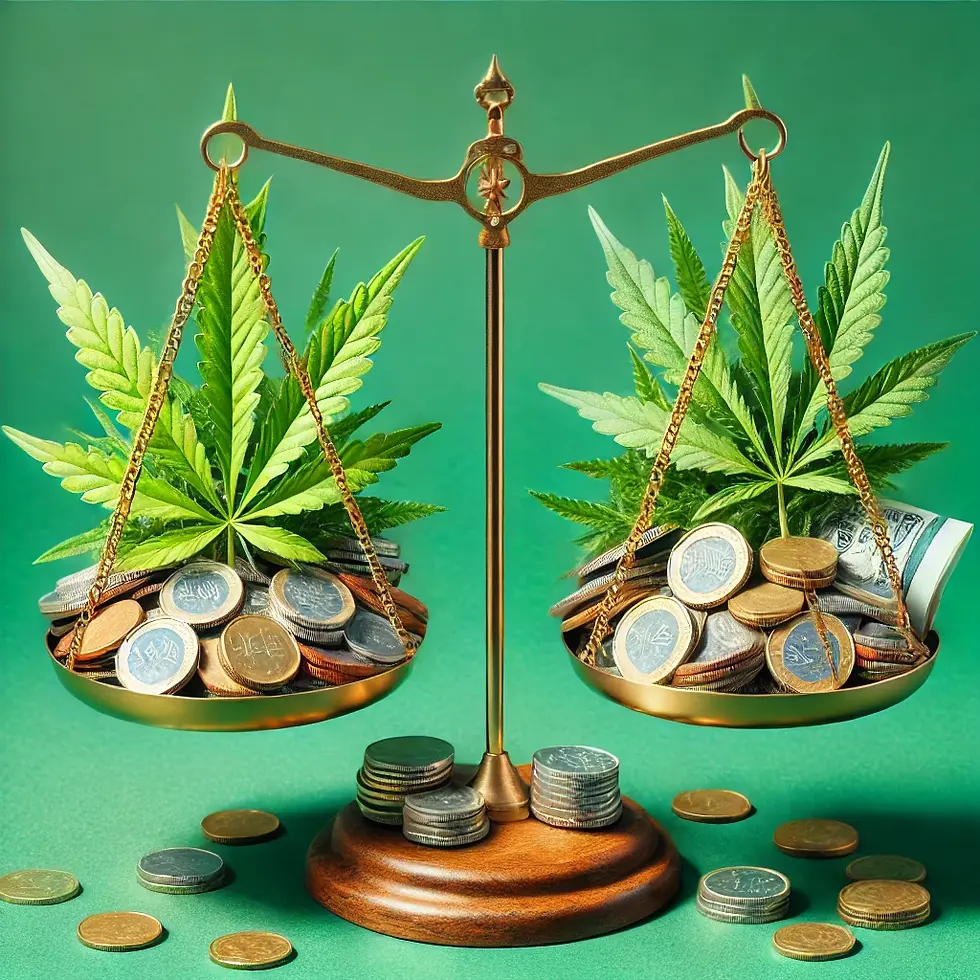
Okay, let’s talk cannabis and hemp—a.k.a. the dynamic duo of plants that can do almost everything except your taxes. I’ve spent over five years in the trenches researching these miracle plants and countries that have adopted them, and what I’ve learned is that the benefits of investing in cannabis and hemp are so undeniable that if you’re still on the fence, you’re sitting in the wrong stadium!
From their ability to shelter, feed and heal us to their potential to transform economies, especially here in South Africa. Cannabis and hemp are the future.
And the best part? The future is GREEN—literally!
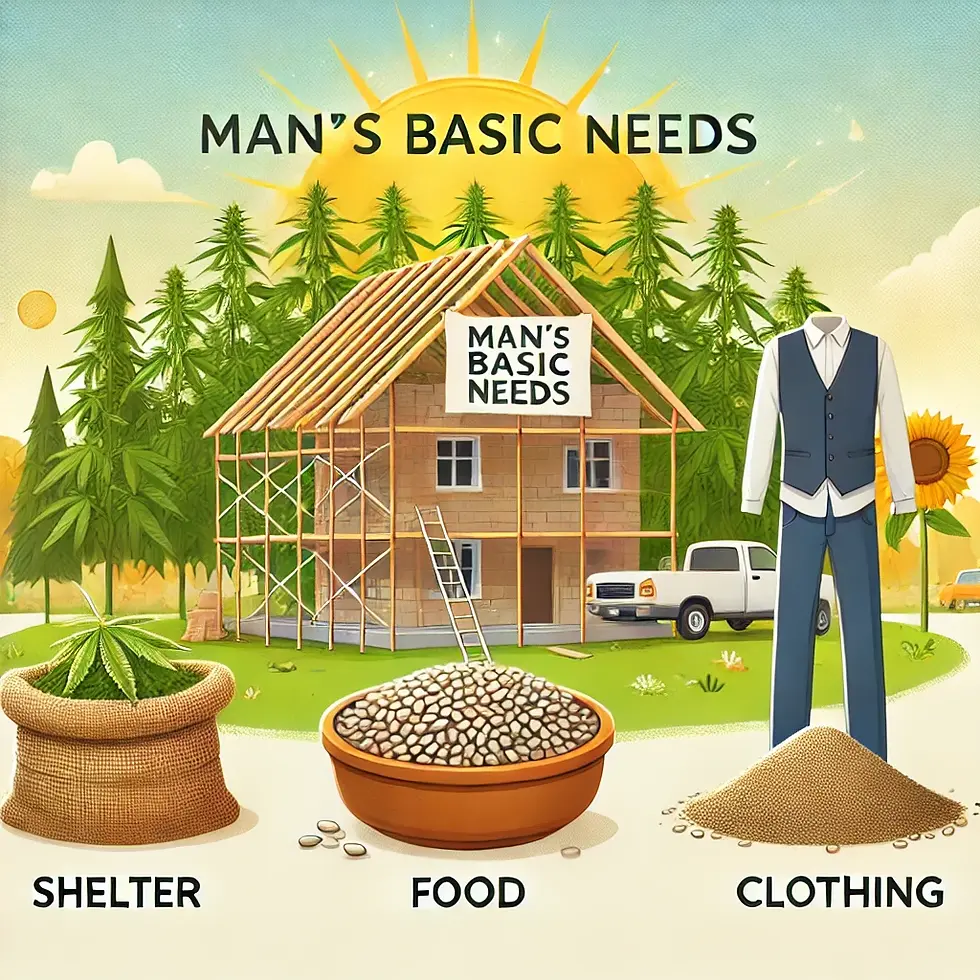
1. Man's Basic Needs
Imagine if I told you that one plant can feed, clothe, and house you? You’d probably say, “This guy must be smoking something,” and you’d be right! But I’m not talking about the recreational stuff, I’m talking about hemp, which has been quietly holding down humanity’s basic needs for centuries. While many of you were growing up watching "Generations" hemp was out here making shelter, textiles and superfoods.
Hemp can build homes with hempcrete—a carbon-negative building material (yes, you read that right, Carbon Negative) that insulates and breathes. In fact, companies like "Afrimat Hemp" a Cape Town-based company, is pioneering and beneficiating the industrial hemp value chain in africa and are jumping on board to make construction cheaper and greener. And if you’re thinking, “Well, that’s cool, but what about fashion?”—don’t worry, hemp’s got you covered too. Literally.
Brands like "Hemporium" and "HempLove" in South Africa are making clothes that are durable, breathable, and sustainable. Forget cotton; hemp's the OG of fabrics—less water, fewer pesticides more style.
And let’s not forget food! Hemp seeds are little nutrient bombs. They’ve got more protein than that steak you’re grilling on Saturday, plus they’re packed with omega-3s and essential nutrients. But wait there's more: hemp isn’t just about seeds or oils—there’s a whole menu of hemp-based foods and drinks that could revolutionize our diets.

Picture this: instead of the same old bread on South African retail shelves, imagine loaves made from hemp flour, offering a gluten-free, high-fiber alternative that’s as hearty as it is healthy. Then there’s hemp milk, which could easily replace your usual dairy or nut-based milks with a creamy nutritious boost that’s packed with plant-based protein. It's a more sustainable option too—no need for the massive water consumption that comes with almond farming or the environmental footprint of dairy.
Even in the snack aisle, hemp protein bars or hemp seed crackers could be the next big thing. They’re a fantastic alternative to the processed options we usually reach for, providing a natural, nutrient-dense option for a quick snack or post-workout fuel. Hemp seeds can also replace the sunflower seeds or flax in your favorite granola or health bars.
Then we’ve got the beverages—hemp-based teas, smoothies, and even hemp beer are all making waves globally. Imagine sipping on a refreshing, low-alcohol hemp beer at a braai, offering a smooth taste and a lower calorie count than your average lager. Given our love of unique drinks here in Mzansi, hemp-infused rooibos or cold-pressed hemp juices and other tonics could find a welcome place on retail shelves next to your typical iced teas and health drinks.
In short, hemp could replace or improve many of the products we already have on our shelves, offering healthier, more sustainable, and nutrient-packed alternatives to what we’re used to. From bread to infused rooibos, South Africa’s grocery scene could get a serious upgrade with hemp.

As for powering homes? Hemp isn’t just knocking on Eskom’s door; it’s bringing a whole toolkit of green energy options, including gas and biofuel. Hemp gas can be created through anaerobic digestion (basically, letting hemp plants break down in a controlled environment) and this biogas could be used to power everything from stoves to generators. It’s like having your very own natural gas supplier growing in the backyard!
Now, biofuel from hemp is where things get really interesting. If you've heard of Zinhle Ngidi, you know she’s a powerhouse in the South African clean tech scene. Through her company, Igugu Clean Tech, she’s been making strides in biodiesel production using various organic materials. Imagine taking the same innovations she’s championing and applying them to hemp. Hemp seeds are particularly rich in oil, which can be converted into biodiesel—similar to the kind already being used for trucks and farm equipment.
Hemp biofuel could be the next big thing on our retail shelves, replacing traditional diesel and LPG (liquefied petroleum gas) that’s commonly sold for cooking or backup power. Just like Zinhle’s work is setting the stage for a greener South Africa, hemp can provide a sustainable, locally-grown alternative that mirrors her clean-tech success. No more load-shedding nightmares—just a future where South African homes and industries are powered by plants, not fossil fuels.

2. Medicinal and Nutritional Value
Now, you’ve probably heard your neighbour say, "Ag man, cannabis helps with everything!" Well, they’re not far off. Globally, countries like Canada and Israel have been using medicinal cannabis for years to treat everything from anxiety to chronic pain, and they’re not shy about it. The research is legit, and South Africa is waking up to this reality.
You see, cannabis contains compounds like CBD (the one that won’t get you high) that are proven to reduce anxiety, help with sleep disorders, and even ease inflammation. There’s solid evidence—studies published in Frontiers in Pharmacology and Nutrients—that show how beneficial CBD is for chronic pain and heart health. Forget popping painkillers all the time, we’ve got a plant for that!
For those wondering about the nutritional value of hemp, think of it as the love child of spinach and quinoa—full of essential fatty acids, proteins, and vitamins. Hemp can feed communities and is a game-changer for nutrition, especially in regions facing food insecurity.
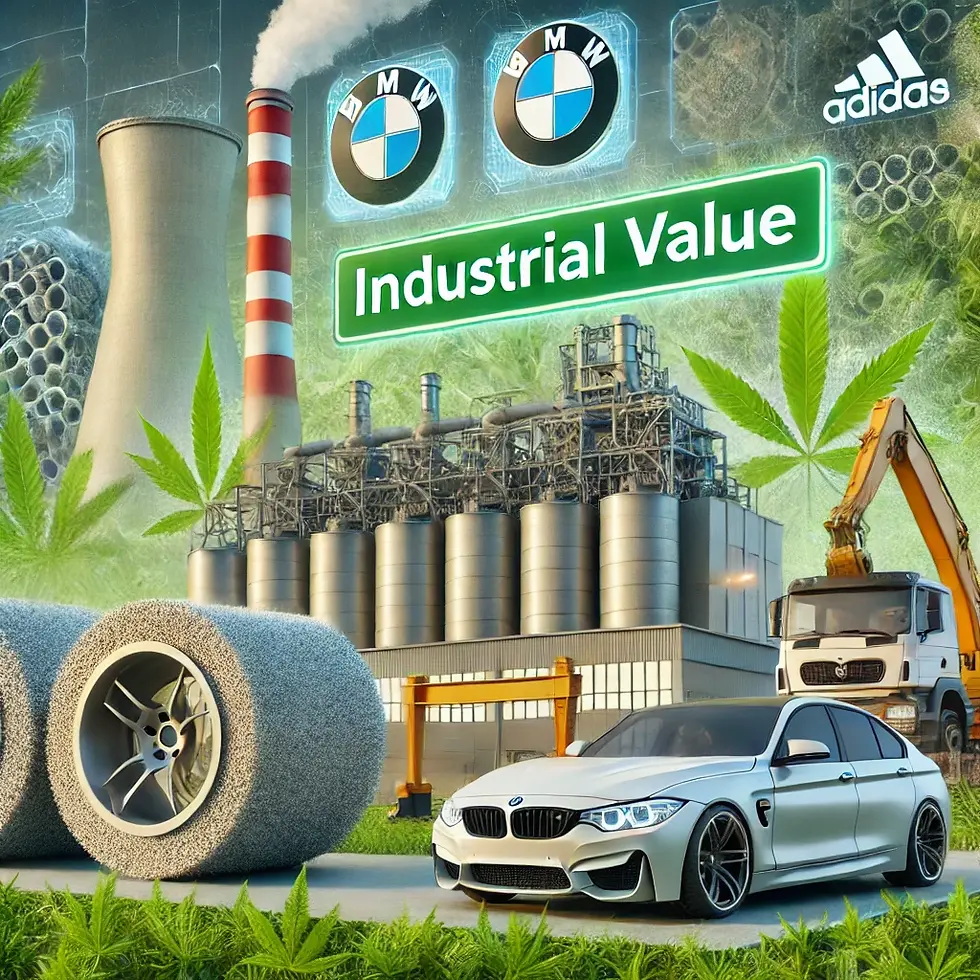
3. Industrial Value
Okay, here's where hemp flexes harder than a bodybuilder. Industrially, hemp can do everything. It’s like the Swiss Army knife of plants.
Need bio-plastics? Hemp’s got you. Need paper? Hemp. Need car parts? Yep, BMW and Mercedes-Benz are already using hemp-based composites in their cars to make them lighter, stronger and eco-friendly. Hemp is even making its way into the world of sneakers with brands like Adidas dabbling in hemp shoes. Imagine kicking it in shoes that are good for the planet.
And the best part? Hemp grows like a weed (pun intended). It doesn’t need a lot of water or pesticides so it’s perfect for sustainable farming practices. As the world tries to figure out how to save the planet from climate change, hemp could very well be the hero we didn’t know we needed. With South Africa’s climate, we’re sitting on a goldmine—or should I say, greenmine—of opportunity here.

4. Societal Value
Now, I know what some of you are thinking. “Cannabis? What will my Gogo say?” Well, let me tell you—she might start thanking you! Countries that have legalized cannabis are seeing something remarkable: a reduction in alcohol and opioid abuse. Don’t take my word for it, look at the data. In the U.S., states with legal medical cannabis have seen significant drops in opioid overdose deaths, according to research published in The Journal of the American Medical Association. And you know how South Africans love a good drink—imagine a future where more people are chilling with a joint instead of downing bottles. Fewer hangovers, less drinking and driving cases and a healthier society? Yes, please!
The societal impact is bigger than just what people consume—it’s about mental well-being, too. Legal cannabis offers a natural alternative to pharmaceuticals that often come with a laundry list of side effects. Imagine what that could do for our communities struggling with stress, anxiety or even PTSD? We’re talking real solutions here.

5. Economical Value
Finally, let’s talk rands and cents. South Africa is perfectly positioned to become a global cannabis and hemp powerhouse. We’ve got the climate, the land, and the know-how. Now we just need to roll it out (pun intended).
Hemp and cannabis farming could inject billions into our GDP while creating thousands of jobs, especially in rural areas. The cannabis sector is a major opportunity for places like townships and farming communities that have historically been left behind. It’s time to uplift these communities by giving them access to this booming industry. With initiatives like "Umhlahlandela Farming Projects" and #CronicScience, we’re already making strides in empowering local farmers to get involved and start cultivating.
What’s South Africa’s competitive advantage, you ask? We’ve got the history of cultivation—indigenous communities have been growing dagga long before it was cool—and our labour costs are lower than most major producers. Plus, the global market is hungry for South African grown cannabis and hemp products. We just need to seize the moment!





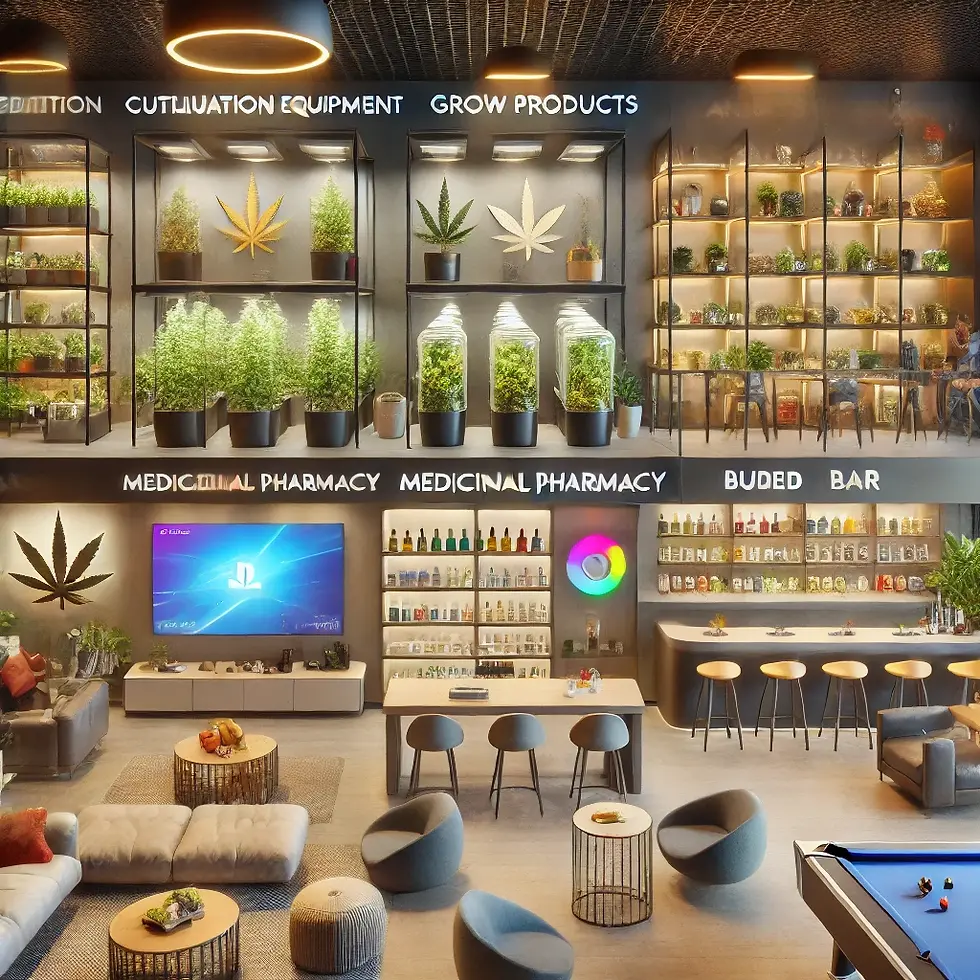
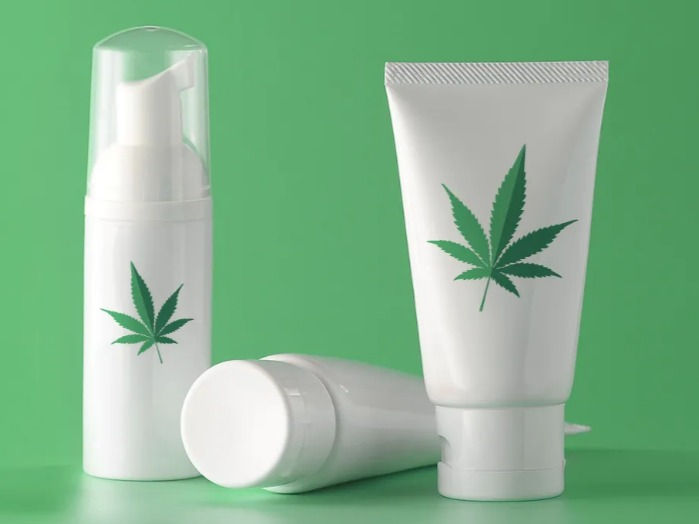

Comments